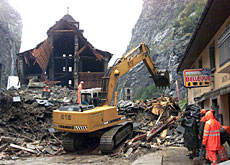Spending plans from gold sales given short shrift

The Swiss have thrown out a government plan to use proceeds from the sale of excess gold reserves for humanitarian projects.
Voters rejected two proposals on how to spend the money – a clear signal that the government needs to come up with new ideas about what to do with the cash.
Voters turned down the government plan to divide the money equally among the state pension scheme, the cantons and the so-called Solidarity Foundation, which would support good causes both at home and abroad.
A counter-proposal, by the rightwing Swiss People’s Party, to spend all the money on the state pension scheme was also thrown out.
Both proposals needed a majority of voters and cantons to pass (see related story “Cantonal majority principle”). Counting of individual ballots is still going on but neither proposal won over a majority of cantons.
The dual rejection means the government has to go back to the drawing board.
Negative impact
Charities and supporters of the Solidarity Foundation say a rejection would have a negative impact on Switzerland’s image, which is still recovering from scandals over its Holocaust-era role in the 1990s.
“The international image of Switzerland is ambivalent,” says Jürg Krummenacher, director of the charity, Caritas.
“On the one hand, we have this picture of a rich isolationist country… on the other hand, Switzerland also has the image of being a country with a humanitarian tradition, and I think approval of the Solidarity Foundation would enforce this image.”
The Solidarity Foundation would have shared an annual figure of between SFr500 – 700 million, which is the interest on the capital derived from selling 1,300 tons of gold reserves held by the Swiss National Bank.
Nothing to do with the past
Throughout the campaign, the government consistently denied that the Solidarity Foundation had anything to do with making reparations for past mistakes. It also ruled out giving any of the money to Holocaust survivors or anyone else with a grievance against Switzerland.
But since it first proposed the idea in 1997 – in the wake of fierce international criticism over Switzerland’s wartime past – rightwing opponents have accused the government of caving into overseas pressure.
“There is not the slightest reason to feel guilty about the way we behaved [during the Second World War],” said Luzi Stamm, member of parliament for the Swiss People’s Party.
Supporters of the Solidarity Foundation argued that it offered an opportunity for Switzerland to demonstrate its commitment to international cooperation.
“It’s a question of what sort of Switzerland we see,” said Walter Schmid, who is director of the project.
“Whether we see Switzerland as a rather isolationist country, just thinking of itself, or whether we see it as an active partner in the world.”
Humanitarian tradition
However, opponents of the Foundation, such as Stamm, argued that Switzerland is already heavily committed to international humanitarian work.
“We’ve got the Red Cross, and lots of other aid organisations,” Stamm told swissinfo. “We don’t need another one.”
Jürg Krummenacher of Caritas warned against assuming that Switzerland was more generous than other countries when it comes to aid.
“What we pay in development aid is more or less average,” he told swissinfo. “We are not paying more than the others. The Solidarity Foundation [would have been] a welcome addition, but it would not bring us to the top of the list.”
swissinfo
The sale of 1,300 tons of gold reserves (around half the country’s total reserves) held by the Swiss National Bank would raise SFr20 billion.
The Swiss government proposes that the annual interest from this sum, between SFr500 and 700 million, should be split equally between state pensions, the Swiss cantons, and humanitarian aid projects.
The Swiss People’s Party says all the money should go into state pensions.
Switzerland tops the world in per capita gold reserves, even after the sale of 1,300 tons.

In compliance with the JTI standards
More: SWI swissinfo.ch certified by the Journalism Trust Initiative

You can find an overview of ongoing debates with our journalists here. Please join us!
If you want to start a conversation about a topic raised in this article or want to report factual errors, email us at english@swissinfo.ch.